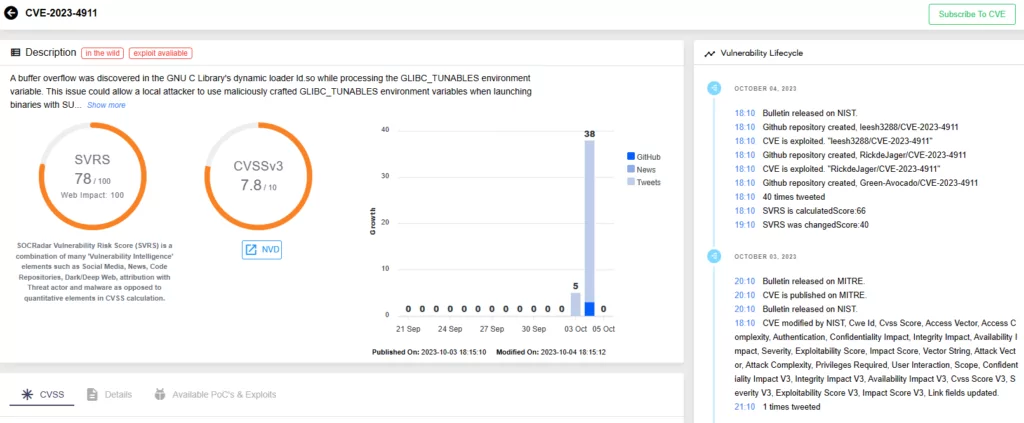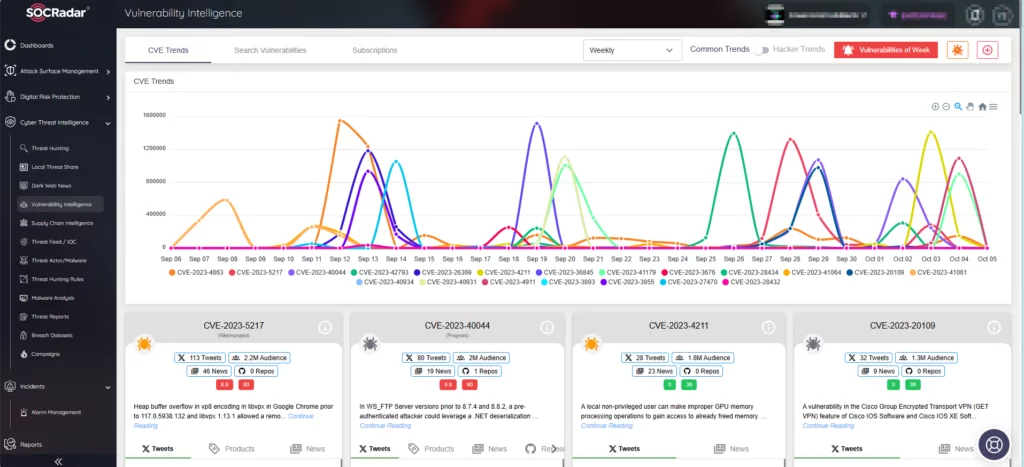Researchers have released a Proof-of-Concept (PoC) exploit for a new high-severity vulnerability, dubbed ‘Looney Tunables,’ which impacts the majority of well-known Linux distributions. This vulnerability allows attackers to execute local privilege escalation (LPE) and acquire complete root privileges.
Exploitation of this vulnerability presents a significant risk, as it could lead to potential data breaches, system alterations, and the complete takeover of vulnerable systems.
What is the ‘Looney Tunables’ Vulnerability About? (CVE-2023-4911)
The vulnerability, identified as CVE-2023-4911 (CVSS score: 7.8, High), is a buffer overflow issue in the GNU C Library’s – commonly known as glibc – ld.so dynamic loader. The vulnerability was introduced into the code in April 2021 with the release of glibc 2.34, and recently, researchers have released a Proof-of-Concept (PoC) exploit for it, underscoring the urgency of patching.
CVE-2023-4911 resides in the dynamic loader’s handling of the GLIBC_TUNABLES environment variable. According to Red Hat, a local cybercriminal can manipulate this vulnerability through maliciously crafted GLIBC_TUNABLES environment variables. This allows them to launch binaries with SUID permissions and execute code with elevated privileges.
 Details of the CVE-2023-4911 (Looney Tunables) vulnerability on SOCRadar platform.
Details of the CVE-2023-4911 (Looney Tunables) vulnerability on SOCRadar platform.
Why is the Vulnerability So Important?
The glibc library within Linux systems is foundational, offering critical functionalities such as open, read, write, malloc, and more. Particularly, the dynamic loader embedded in the library holds immense significance, as it manages the preparation and execution of programs on Linux systems utilizing glibc.
GLIBC_TUNABLES is of great value for developers and system administrators to optimize applications in sync with glibc — the environment variable was introduced in glibc to allow users to dynamically adjust the library’s behavior. Exploitation of this feature, on the other hand, could have negative consequences, affecting system performance, reliability, and, most importantly, security.
Which Linux Distributions Are Affected by the Vulnerability?
The vulnerability impacts major Linux distributions, including:
- Fedora 37 and 38
- Ubuntu 22.04 and 23.04
- Debian 12 and 13
While certain distributions like Alpine Linux remain unaffected, many other distributions are still vulnerable to the Looney Tunables vulnerability, CVE-2023-4911.
Proof-of-Concept (PoC) Exploit for Looney Tunables Linux Vulnerability
It is explained in the PoC exploit for Looney Tunables that a particular buffer is created in the program’s code at line 284 using a function called “tunables_strdup().” This function is a re-implementation of another function called “strdup(),” but it is designed to work a little differently.
Instead of using a standard memory allocation of glibc method called “malloc(),” strdup() uses a different one called “__minimal_malloc()” from ld.so. This __minimal_malloc() function, in turn, requests additional memory from the kernel using a function called “mmap().”
You can find the PoC and additional technical details regarding the vulnerability in the official write-up. You can also find a video demonstration of the exploit on YouTube.
The release of a PoC exploit raises concerns, as it potentially invites threat actors who are eager to exploit the vulnerability. However, it also heightens awareness and underscores the importance of timely patching.
Enhance Vulnerability Management with SOCRadar’s Threat Intelligence
As Linux users and administrators, staying informed, keeping your systems current, and remaining vigilant are all essential in navigating the ever-changing landscape of cybersecurity threats.
SOCRadar’s threat intelligence assists organizations in staying updated on the latest vulnerabilities and risks. With the Vulnerability Intelligence module, users can easily access comprehensive information on all documented vulnerabilities, enabling you to take preventive measures to mitigate any potential harm.
 SOCRadar Vulnerability Intelligence
SOCRadar Vulnerability Intelligence
Additionally, SOCRadar’s Attack Surface Management (ASM) module enables users to discover their digital assets and receive alerts regarding emerging issues. The platform uses notifications to promptly inform your organization of potential threats, streamlining the process of prioritizing actions and managing patches.
 SOCRadar ASM/Company Vulnerabilities
SOCRadar ASM/Company Vulnerabilities
The post Looney Tunables: PoC Available for LPE Vulnerability Impacting Major Linux Distributions (CVE-2023-4911) appeared first on SOCRadar® Cyber Intelligence Inc..
Article Link: Looney Tunables: PoC Available for LPE Vulnerability Impacting Major Linux Distributions (CVE-2023-4911)
